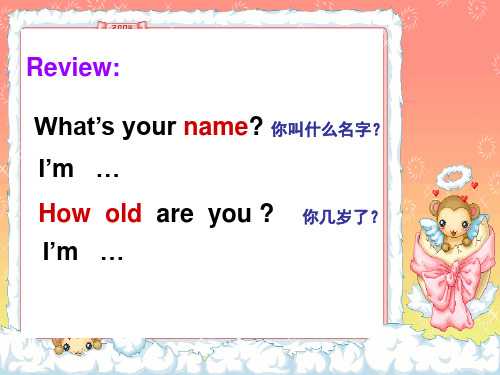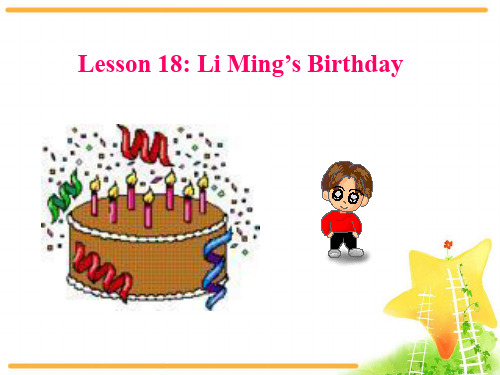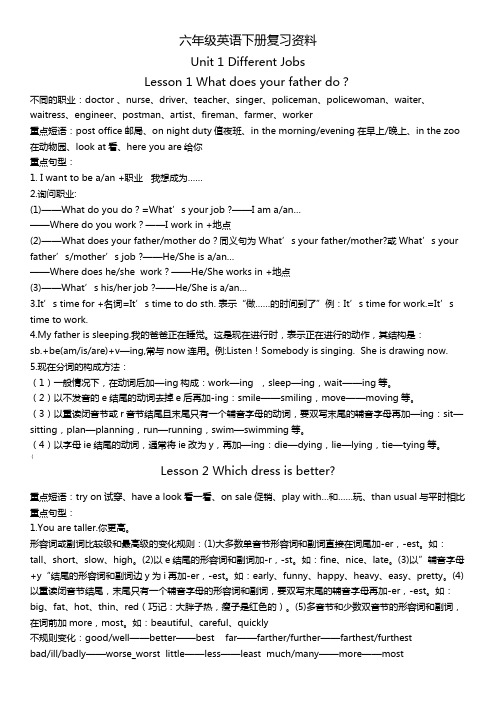UNIT 3 JOBS LESSON 18-What does your aunt do -1
- 格式:ppt
- 大小:3.18 MB
- 文档页数:10




新概念一重点课文一、Lesson 1 - Excuse me!1. 课文内容。
- 这篇课文主要围绕日常的礼貌用语展开。
例如:“Excuse me! Yes?”“Is this your handbag?”“Pardon?”“Thank you very much.”这些简单的句子展示了在询问物品所属关系时的基本对话。
2. 重点词汇。
- excuse:原谅;handbag:手提包;pardon:原谅,请再说一遍;thank:感谢。
3. 语法要点。
- 一般疑问句:“Is this your handbag?”这是一个典型的一般疑问句结构,be 动词(is)放在句首,回答是“Yes, it is.”或者“No, it isn't.”二、Lesson 3 - Sorry, sir.1. 课文内容。
- 课文描述了一个男孩不小心挡住了一位先生的路,先生让他走开,男孩道歉的场景。
“My coat and my umbrella please. Here is my ticket. Thank you, sir. Number five. Here's your umbrella and your coat. This is not my umbrella. Sorry, sir. Is this your umbrella? No, it isn't.”2. 重点词汇。
- umbrella:雨伞;ticket:票;sir:先生。
3. 语法要点。
- 指示代词:“This is not my umbrella.”中的“this”是指示代词,用来指代近处的事物。
三、Lesson 7 - Are you a teacher?1. 课文内容。
- 这是一个关于询问职业的简单对话。
“I am a new student. My name's Robert. Nice to meet you. My name's Sophie. Are you French? Yes, I am. Are you French too? No, I am not. What nationality are you? I'm Italian. Are you a teacher? No, I'm not. What's your job? I'm a keyboard operator.What's your job? I'm an engineer.”2. 重点词汇。


六年级英语下册复习资料Unit 1 Different JobsLesson 1 What does your father do?不同的职业:doctor 、nurse、driver、teacher、singer、policeman、policewoman、waiter、waitress、engineer、postman、artist、fireman、farmer、worker重点短语:post office邮局、on night duty值夜班、in the morning/evening在早上/晚上、in the zoo 在动物园、look at看、here you are给你重点句型:1. I want to be a/an +职业我想成为……2.询问职业:(1)——What do you do?=What’s your job ?——I am a/an…——Where do you work?——I work in +地点(2)——What does your father/mother do?同义句为What’s your father/mother?或What’s your father’s/mother’s job ?——He/She is a/an…——Where does he/she work?——He/She works in +地点(3)——What’s his/her job ?——He/She is a/an…3.It’s time for +名词=It’s time to do sth. 表示“做……的时间到了”例:It’s time for work.=It’s time to work.4.My father is sleeping.我的爸爸正在睡觉。
这是现在进行时,表示正在进行的动作,其结构是:sb.+be(am/is/are)+v—ing,常与now连用。
冀教版六年级英语下册 Unit 3 Lesson 18 教案设计教学目标1.学习并掌握关于节日的单词和短语。
2.能够听懂、理解并会表达一些关于节日的基本信息。
3.提高学生们的英文口语、听力和阅读能力。
教学重点1.学习节日相关的单词和短语。
2.掌握句型:“What do people do on…”和“Do you like…?”教学步骤1. Warm-up首先,教师可以与学生进行以下对话:Teacher: Good morning, everyone! Do you like festivals?Students: Yes, we do.Teacher: What festivals do you like?Students: We like Spring Festival, Mid-Autumn Festival, National Day…教师可以适当回答学生一些问题,让学生了解节日的一些背景知识。
然后,询问学生他们了解哪些节日,了解每个节日的内容是什么。
让学生们通过讨论,梳理出与节日相关的单词和短语。
2. Presentation接下来,教师可以通过图片、视频等媒介进行节日的呈现。
在展示过程中,带领学生回答与节日相关的问题,如:•What do people do on Spring Festival?•Do you like Mid-Autumn Festival? Why?在问答过程中,教师可以适当向学生解释一些生词、短语,例如:red envelopes, fireworks, family reunion, eat mooncakes等。
3. Practice在展示节日的过程中,教师可以让学生跟读、模仿,并进行组内对话练习,如:•A: What do people do on Spring Festival?•B: They have a big dinner with their families and get red envelopes.•A: Do you like Spring Festival?•B: Yes, I do. I can eat dumplings and stay with my family.教师可以让学生进行小组活动,讨论并准备一个小节目,或制作一个海报介绍其中一个节日。
Unit 3 ComputersLesson 1教学目标词组A1. make a phone order 打电话预定2. do a survey 做调查3. be short of 缺乏;短缺4. pocket money 零花钱5. main unit 主机6. get smaller and smaller 变得越来越小7. fly planes 驾驶飞机8. work as 任……职9. be unaware of 没有意识到;不知道10. depend on 依靠11. do with 处理12. use… to do 用……来做……13. at a speed 以……速度14. in addition除此之外15. what about ……怎么样16. in front of 在……前面17. human being 人类18. be good(better) at doing sth. 擅长做……19. change our lives 改变我们的生活20. the most expensive最贵词组B1. as well 也2. get on the Internet 上网3. sub-heading 副标题4. for example 举例5. washing machine 洗衣机6. daily life 日常生活7. be cleverer than 比……更聪明8. in the future 将来9. be made of 由……制造(看得见原材料)10. comparative 比较级11. superlative 最高级12. search engine 搜索引擎13. keywords 关键词14. how often 多久一次15. be similar to 与……相似16. be popular with 受……欢迎17. send an email 发一封电子邮件18. grand total 总计19. look forward to doing sth. 期待做……20. be bad for 对……有害英英释义1. be short of =lack 缺少;短缺2. be able to=can 能够3. depend on=be dependent on =rely on 依靠4. have fun=have a good time 玩得开心5. as well=too 也6. what about=how about ……怎么样7. what do you think of=how do you like 你认为……怎么样?8. be bad for=be harmful to=do harm to 对……有害9. be unaware of=don’t know 没意识到;不知道10. over=more than 超过课文Computer factsSmaller and betterIn the 1940s, the first computers were bigger than cars. Now computers are becoming smaller and better.Some computers are tiny. You may be unaware of them. There is probably one inside your TV or washing machine. You depend on computers more than you realize.What can we do with computers?We can use computers to calculate. They can calculate at a faster speed than we can and almost never give wrong answers. We can also type and draw things with them. In addition, computers can do important jobs like operating railways and flying planes and spaceships.Is a computer cleverer than me?The answer is “No”. Your brain can produce new ideas but computers cannot. However, one day computers may be able to do a better job than human beings. For example, they may be better than doctors at doing their job.What will happen to us if computers can do all out jobs? Will we have nothing to do? Computers may change our lives, but will they make them better?重点句型解析A1. Listen to a woman making a phone order. 听一位妇女在打电话订货。
六年级下册英语教案-Unit 3 Lesson 18 人教(精通版)课程教学目标•学习并掌握如何表达体能活动以及如何询问他人是否喜欢某项体能活动。
•学会在团队中相互合作,探究搭配细节,能够礼貌地表达自己的意见。
课程教学重点•学生能够熟练掌握各项体能活动的表达方式,理解并能够使用他语言表达出自己的体能活动的意愿。
•学生能够扩展自己的词汇量,学会活用生活中的语料并且灵活运用。
课程教学难点•学生在扩展词汇量的同时要求灵活运用,丰富自己的语言表达,并且符合实际用法。
•学生在练习体能活动的同时要求具备良好的精神风貌和团体合作精神。
课程教学流程一、学习新课(15分钟)1.班级预习回顾并进行互帮互助,进行语句模拟练习,通过模拟细节来提高自己的表达能力。
2.教师介绍本节课的主要内容和授课方法,提醒学生注意学习方法和技巧。
在听、说、读、写四个方面进行课程教学。
3.教师为学生呈现本节课的学习重点,提供学术支持和理论依据,梳理系统知识点,为学生提供更加精细化和高效化的教学体验。
二、操练体能活动表达方式(20分钟)1.在课堂上教师向学生展示与体能活动相关的图片,并利用图片与学生一起讨论如何询问对方是否喜欢某项体能活动,并学习相关的表达方式。
2.学生进行小组互动,通过互相交流来锻炼自己的语言表达能力、闹笑话、实现小组合作、促进行为团结一致的目标,并且通过游戏来学习和练习。
三、语法练习(20分钟)1.在教材中找出相关例句,让学生学习掌握相关语法,以此来促进学生对语法的学习和理解,提高其语言表达能力。
2.中英文闪现练习,让学生在较短的时间内明确自己的表达意图,从而加深对语言意义的考虑和理解,提高口语交流的自由度和流畅度。
四、文化学习(10分钟)1.教师向学生介绍相关文化背景,包括课文背景、相关历史和文化。
2.让学生通过学习和讨论更深入地了解相关文化背景,从而充分发掘课文中的语言意义,强化学生语感和综合素养。
五、总体练习(10分钟)1.将教材中的相关练习放入总体练习之中,用于深化学生对课堂内容的理解和掌握,检测学生学习成果。